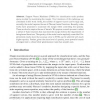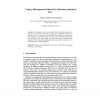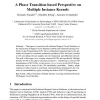2055 search results - page 120 / 411 » Nested support vector machines |
ICANN
2007
Springer
15 years 4 months ago
2007
Springer
Support Vector Machines (SVMs) for classification tasks produce sparse models by maximizing the margin. Two limitations of this technique are considered in this work: firstly, th...
115
Voted
AI
2011
Springer
14 years 1 months ago
2011
Springer
In this paper, we adopt a supervised machine learning approach to recognize six basic emotions (anger, disgust, fear, happiness, sadness and surprise) using a heterogeneous emotion...
ICML
2003
IEEE
15 years 11 months ago
2003
IEEE
We show that a classifier based on Gaussian mixture models (GMM) can be trained discriminatively to improve accuracy. We describe a training procedure based on the extended Baum-W...
IJON
2010
14 years 7 months ago
2010
Several solutions have been proposed to exploit the availability of heterogeneous sources of biomolecular data for gene function prediction, but few attention has been dedicated t...
ILP
2007
Springer
15 years 4 months ago
2007
Springer
: This paper is concerned with relational Support Vector Machines, at the intersection of Support Vector Machines (SVM) and relational learning or Inductive Logic Programming (ILP)...



